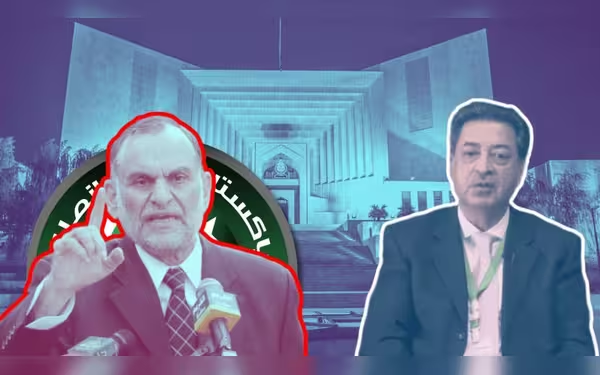Wednesday, January 15, 2025 03:04 PM
Azam Khan Swati Files Complaint Against Chief Election Commissioner
- Swati accuses ECP of electoral manipulation and unfair practices.
- Complaint seeks removal of Chief Election Commissioner and others.
- Allegations include collusion with intelligence agencies to influence elections.
 Image Credits: thefridaytimes
Image Credits: thefridaytimesAzam Khan Swati of PTI files a complaint against Chief Election Commissioner, alleging electoral manipulation and unfair practices, calling for investigations into the ECP's conduct.
On Monday, Azam Khan Swati, a prominent leader of the Pakistan Tehreek-e-Insaf (PTI) party, took a significant step by filing a formal complaint with the Supreme Judicial Council (SJC) against Chief Election Commissioner Sikandar Sultan Raja. This complaint is part of a broader concern regarding the integrity of the electoral process in Pakistan, which has been under scrutiny in recent years due to allegations of manipulation and unfair practices.
Swati's complaint accuses Raja of manipulating the electoral process and calls for action against other members of the Election Commission of Pakistan (ECP), including Justice (Retired) Ikram Ullah Khan, Nisar Ahmed Durrani, Shah Muhammad Jatoi, and Babar Hassan Bharwana. This is the second complaint filed by PTI or its affiliates against the ECP's leadership in the SJC, following a similar complaint submitted on July 27.
Through his attorney, Ali Azim Afridi, Swati urged the SJC to recommend the removal of the chief election commissioner and the other members. The complaint also requests that the SJC initiate proceedings against any individuals who may emerge during the inquiry. Additionally, it calls for the Council to take note of statements made by Rawalpindi Commissioner Liaquat Ali Chatha regarding electoral fraud, which implicates constitutional office holders, including Chief Justice Qazi Faez Isa and Sikandar Sultan Raja.
Swati criticized the ECP for its questionable conduct, asserting that the commission allowed caretaker officials to make significant changes, including transfers and policy decisions, while pretending to be elected representatives. He claimed that this was done at the expense of public funds and to promote a specific political agenda.
According to Swati, the ECP and state machinery allegedly conspired to suppress PTI's participation in the electoral process. He accused the respondents of facilitating the arrest of ordinary citizens and political figures associated with PTI, thereby ensuring that rival parties such as the Pakistan Muslim League-Nawaz (PML-N), Pakistan Peoples Party (PPP), Jamiat Ulema-e-Islam Fazl (JUI-F), and Awami National Party (ANP) were given an unfair advantage.
Swati's complaint alleges that the ECP and state officials engaged in a systematic effort to delay elections and undermine the judgments of the Superior Courts. He claimed that there was widespread speculation that elections would only be held after Chief Justice Qazi Faez Isa assumed his position, following the retirement of his predecessor.
In a serious allegation, Swati suggested that officials from intelligence agencies, including the Inter Services Intelligence (ISI) and Military Intelligence (MI), had met with the then Chief Justice of Pakistan and other judges, allegedly to discuss the manipulation of the electoral process.
Swati's complaint also contends that the irregularities in the election process benefited those who viewed Justice Qazi Faez Isa as their "savior." He accused the respondents of collaborating with state machinery to obstruct candidates from PTI, including the rejection of nomination papers for unjustifiable reasons.
Furthermore, the complaint asserts that the respondents facilitated certain caretakers, such as Sarfaraz Bugti and Nawabzada Jamal Raisani, to contest elections despite their ineligibility under Article 224(1B) of the Constitution of the Islamic Republic of Pakistan. This was allegedly done to further their own agenda, undermining constitutional and legal frameworks.
Swati claimed that after achieving their desired electoral outcomes, the caretaker Prime Minister and the Chief Minister of Punjab were ensured continued positions of power, despite potential conflicts of interest related to their assets and liabilities, as indicated by an alleged doctored press release dated November 14, 2023.
Swati's complaint seeks the intervention of the SJC to investigate the conduct of the respondents throughout the electoral process. He cites various events, including the delay of Senate Elections in Khyber Pakhtunkhwa and the Supreme Court's ruling in the Reserved Seats Case, as grounds for recommending the removal of the respondents from their constitutional offices. This situation highlights the ongoing challenges faced by political parties in Pakistan and raises important questions about the fairness and transparency of the electoral process.













